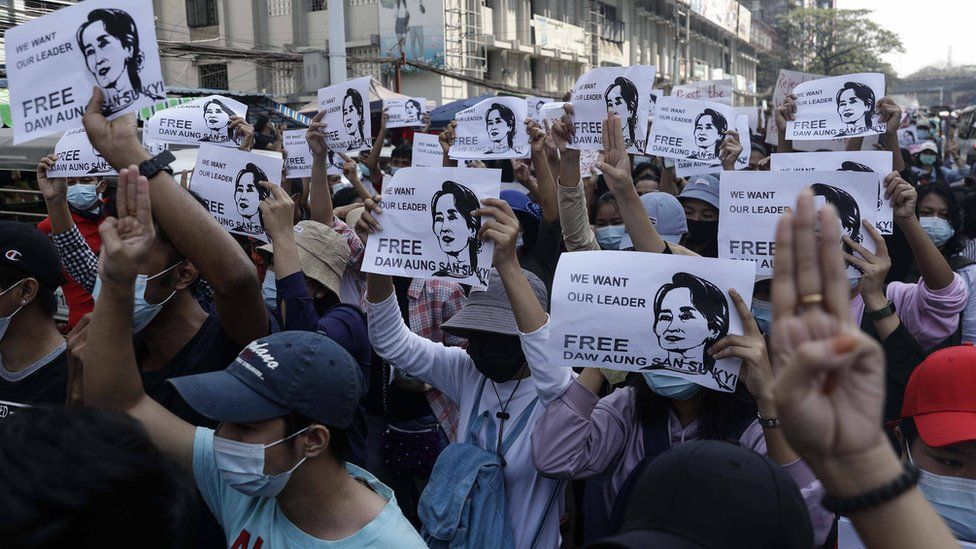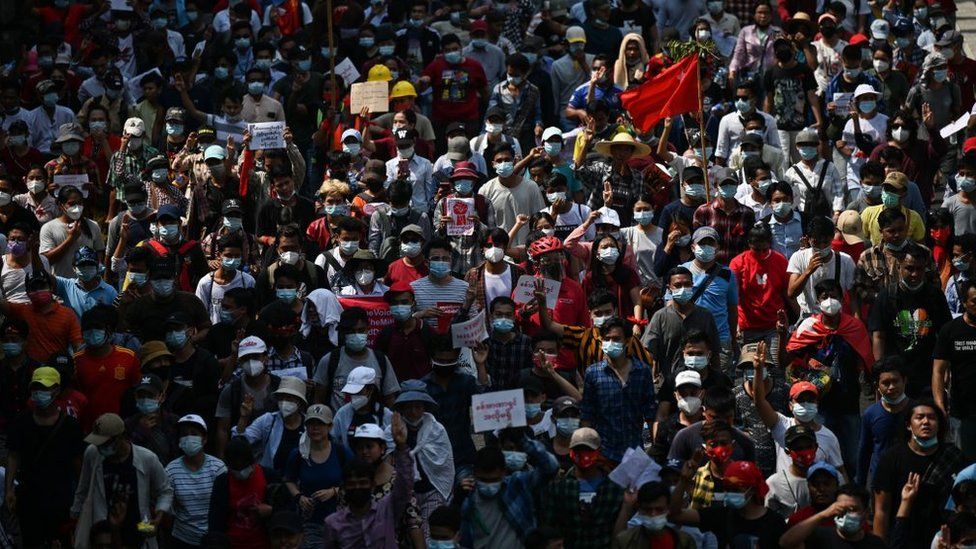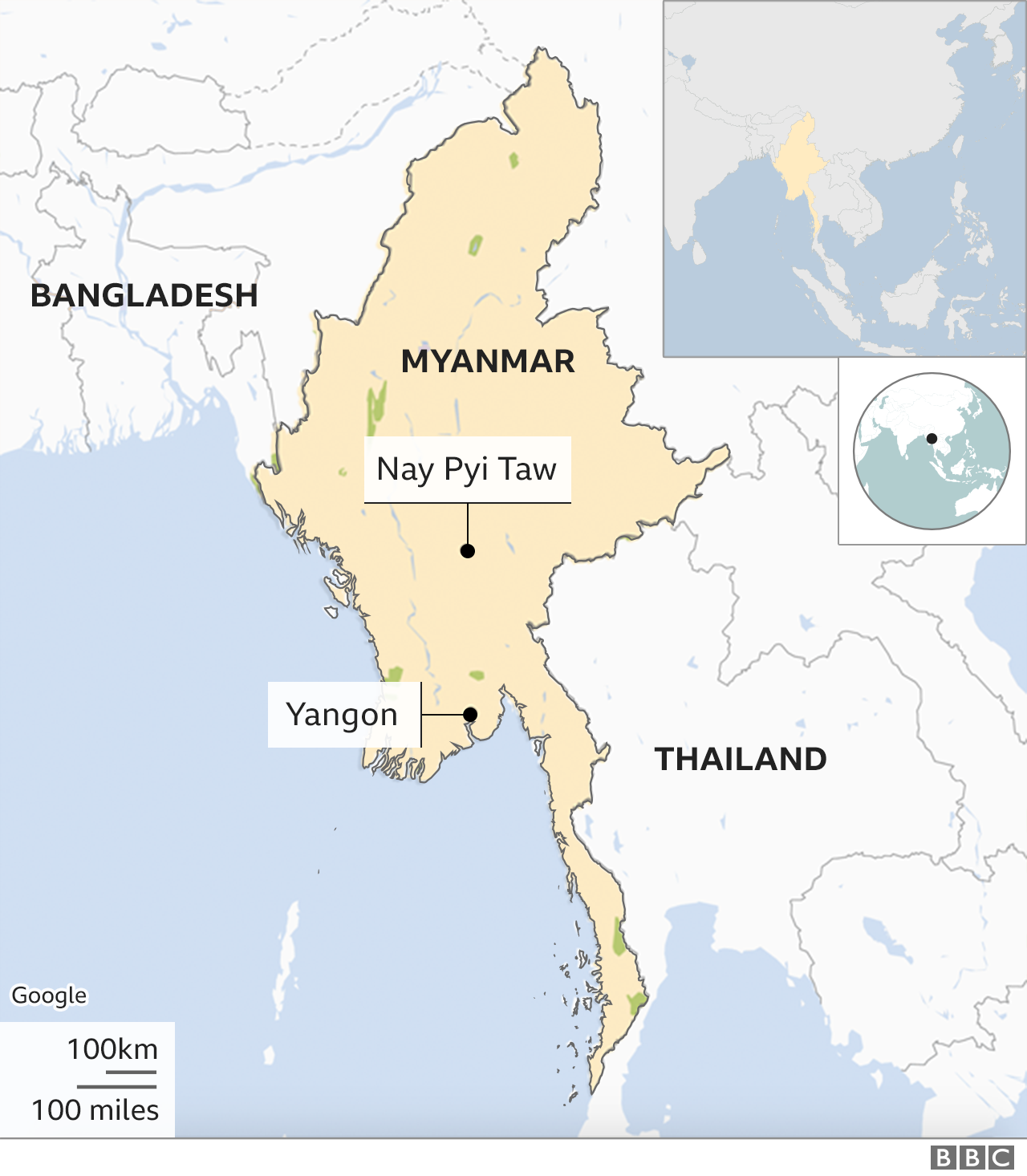
Tens of thousands have protested for a second day in Myanmar's main city, Yangon, thwarting the military's attempt to stop anti-coup rallies by imposing an internet shutdown.
"We don't want military dictatorship," the crowds chanted. Many held pictures of detained leader Aung San Suu Kyi and wore red, the colour of her party.
She has not been seen since the army overthrew her government last Monday.
Internet access now appears to have been partially restored.
The day-long blackout was imposed after the military blocked access to Facebook, Twitter and Instagram to stop people mobilising. Phone services have also been disrupted.
On Sunday, demonstrators in Yangon held red balloons, while cars and buses slowed to sound their horns in support. Many flashed the three-finger salute, which has become a symbol of defiance against authoritarianism in the region.
"Respect our vote," read one banner, in reference to the landslide win of the National League for Democracy Party (NLD) in November's election.
Crowds marched towards the Sule Pagoda in the city centre while police vehicles and officers in riot gear were stationed near Yangon University. There were no immediate reports of violence.
Myo Win, a 37-year-old protester, told Agence France-Presse: "We'll move forward and keep demanding until we get democracy."
So far the military authorities, known for their violent repression tactics, are not stopping this show of mass defiance, BBC South East Asia correspondent Jonathan Head reports. But everyone assumes they will try to before long, our reporter adds.
Ms Suu Kyi and senior leaders of the NLD, including President Win Myint, have been under house arrest since the coup. The army has declared a year-long state of emergency.

Sunday's protests in Yangon were the biggest since the so-called Saffron Revolution in 2007, when thousands of the country's monks rose up against the military regime, Reuters news agency reports.
Smaller demonstrations were also held in the capital, Nay Pyi Daw and in the country's second-largest city, Mandalay. In Mawlamine, there were reports of shots being fired but no-one was hurt.
The military authorities, hunkered down in the capital, have not commented.
Internet returns
Internet connectivity rose to about 50% by 14:00 local time (07:30 GMT), according to the monitoring group NetBlocks Internet Observatory. It remained unclear if restoration would be sustained and social media remained blocked, it said.
Earlier, despite connectivity being at 14% of usual levels, some images and videos of the protests were posted online.
The shutdown was criticised by human rights groups. Amnesty International said the blackout was "heinous and reckless" and warned it could put people at risk of human rights violations.
The United Nations special rapporteur on Myanmar, Tom Andrews, said: "The generals are now attempting to paralyse the citizen movement of resistance - and keep the outside world in the dark - by cutting virtually all internet access."
The coup took place as a new session of parliament was set to open, following the November election in which the NLD won 80% of parliamentary seats.
Many Burmese watched the events unfold in real time on Facebook, which is the country's primary source of information and news.
Myanmar at a glance
Myanmar is a country of 54 million people in South East Asia which shares borders with Bangladesh, India, China, Thailand and Laos.
It was ruled by an oppressive military government from 1962 to 2011, either directly or indirectly, leading to international condemnation and sanctions.
Aung San Suu Kyi spent years campaigning for democratic reforms. A gradual liberalisation began in 2010, though the military still retained considerable influence.
A government led by Ms Suu Kyi came to power after free elections in 2015. But a deadly military crackdown two years later on Rohingya Muslims sent hundreds of thousands fleeing to Bangladesh.
It triggered a rift between Ms Suu Kyi and her previous supporters in the international community after she refused to condemn the crackdown or describe it as ethnic cleansing. But she has remained hugely popular at home.



Have you been affected by recent events in Myanmar? You can share your experience by emailing haveyoursay@bbc.co.uk.
Please include a contact number if you are willing to speak to a BBC journalist. You can also get in touch in the following ways:
- WhatsApp: +44 7756 165803
- Tweet: @BBC_HaveYourSay
- Please read our terms & conditions and privacy policy
If you are reading this page and can't see the form you will need to visit the mobile version of the BBC website to submit your question or comment or you can email us at HaveYourSay@bbc.co.uk. Please include your name, age and location with any submission.
"world" - Google News
February 07, 2021 at 04:41PM
https://ift.tt/3aGBw9p
Myanmar coup: Tens of thousands protest for second day - BBC News
"world" - Google News
https://ift.tt/3d80zBJ
https://ift.tt/2WkdbyX
Bagikan Berita Ini














0 Response to "Myanmar coup: Tens of thousands protest for second day - BBC News"
Post a Comment